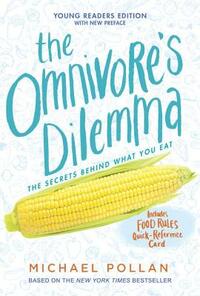Take a photo of a barcode or cover
Put simply, I loved this book. I was expecting a screed against industrialized food but shouldn't have underestimated Michael Pollan. He makes a compelling case against industrialized food all right, but his narrative is much more nuanced and makes compelling reading.
All Americans who plan on continuing to eat should read this. Thorough, and giving voice to numerous points of view and philosophical debates without being dull, I'd call this a tour de force (but that probably doesn't mean much coming from my inexpert knowledge).
hopeful
informative
inspiring
medium-paced
informative
reflective
slow-paced
Interesting and definitely will make me think more closely about the food I eat. I did find it a little hard to keep up with all the different people Pollan introduces but that may have been because I listened to it in audio format vs. reading it.
Really well-written and easy to listen to. I've read a lot in the arena though, so a lot of it was reiteration of things I've read in the past. Really great book for someone just jumping into learning more about where our food comes from though!
Another great book from Michael Pollan. He takes you through the various avenues of food production/procurement, all while relating what he does or sees to a bigger picture for America. When I was an undergraduate, I read the Botany of Desire, another work of his. This is excellent as well. I plan on reading in Defense of Food (another one of his books) soon.
Also, on a side note, I think he would be a pretty neat dinner guest/guy to hang out with. :)
Also, on a side note, I think he would be a pretty neat dinner guest/guy to hang out with. :)
hopeful
informative
inspiring
medium-paced
A great foray into the numerous ways our food systems have been derailed into a malfunctioning machine harming not only the plants and animals it churns but ultimately us, the consumers. Michael highlights the many ways we have damaged plants, from common means such as dangerous chemical fertilisers and pesticides to less known methods including extreme selective breeding of certain crops to the invention of indigestible crops such as “resistance starch”. More extreme is our treatment of animals; restricting their movement, they diet, access to clean hygienic living spaces, breeding partners, …. etc. I was shocked to learn that in the US, the accepted Cattle feed can contain chicken manure, cement dust, feathers, hooves, cardboard, cattle manure … etc.
Overall, the prevalent theme throughout the book is that we lost touch with what eat, and in the process our health and humanity. Michael does a great job by hammering through how we lost our way entirely in the last few decades. If you find yourself admiring human progress in food systems, process and the unlimited access we seem to have nowadays to an apparently limitless selection of food variety, then this book is for you.
- At the risk of sounding self-righteous, and know it all, I don’t know why the Author did not mention Campesina at all in his book. They are an international organisation with huge numbers of farmers, that have been fighting for everything he has talked about, and more. My only guess is that big corporations, including those that published this book, don’t want to risk advertising or spreading the organisation's name.
Overall, the prevalent theme throughout the book is that we lost touch with what eat, and in the process our health and humanity. Michael does a great job by hammering through how we lost our way entirely in the last few decades. If you find yourself admiring human progress in food systems, process and the unlimited access we seem to have nowadays to an apparently limitless selection of food variety, then this book is for you.
- At the risk of sounding self-righteous, and know it all, I don’t know why the Author did not mention Campesina at all in his book. They are an international organisation with huge numbers of farmers, that have been fighting for everything he has talked about, and more. My only guess is that big corporations, including those that published this book, don’t want to risk advertising or spreading the organisation's name.
I feel a lot smarter after reading this book and I know a whole lot more about food in America and where it comes from. Not only was the subject matter interesting, but I really enjoyed Pollan's writing style and journalistic voice.
challenging
informative
medium-paced





